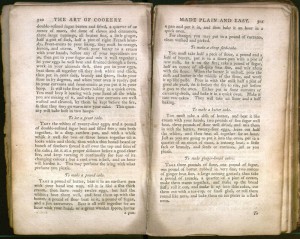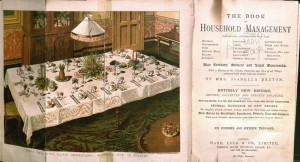 As the oldest girl in a family of twenty-one children, Isabella Mayson (1836–1865) had ample practice in the domestic arts by the time she married Samuel Beeton at the age of 20. Samuel was an innovative editor and publisher, and Isabella participated fully in his publishing business, putting her domestic skills to work as editor of the English Woman's Domestic Magazine. The year after her marriage, Isabella also began work on the monumental compendium of domestic science that is The Book of Household Management. The book was first published it in 1861, when Isabella was only 25, and it was an immediate success due to her attention to accuracy, economy, and taste.
As the oldest girl in a family of twenty-one children, Isabella Mayson (1836–1865) had ample practice in the domestic arts by the time she married Samuel Beeton at the age of 20. Samuel was an innovative editor and publisher, and Isabella participated fully in his publishing business, putting her domestic skills to work as editor of the English Woman's Domestic Magazine. The year after her marriage, Isabella also began work on the monumental compendium of domestic science that is The Book of Household Management. The book was first published it in 1861, when Isabella was only 25, and it was an immediate success due to her attention to accuracy, economy, and taste.
Isabella died of childbed fever only a few years later, at the age of 28. After her death, Samuel sold the rights to her book to the publisher Ward, Lock, and Tyler, whose intense marketing created the Victorian domestic icon that Mrs. Beeton later became.
Baked Beef (Cold Meat Cookery)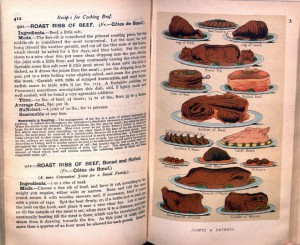
Ingredients.—About 2 lbs. of cold roast beef, 2 small onions, 1 large carrot or two small ones, 1 turnip, a small bunch of savoury herbs, salt and pepper to taste, 4 tablespoonfuls of gravy, 3 tablespoonfuls of ale, crust or mashed potatoes.
Mode.— Cut the beef in slices, allowing a small amount of fat to each slice; place a layer of this in the bottom of a pie-dish, with a portion of the onions, carrots, and turnips, which must be sliced; mince the herbs, strew them over the meat, and season with pepper and salt. Then put another layer of meat, vegetables, and seasoning; and proceed in this manner until all the ingredients are used. Pour in the gravy and ale (water may be substituted for the former, but it is not so nice), cover with a crust or mashed potatoes, and bake for ½ hour, or rather longer.
Time.—Rather more than ½ hour.
Average cost, exclusive of the meat, 6d.
Sufficient for 5 or 6 persons.
Seasonable at any time.
Note.—It is as well to parboil the carrots and turnips before adding them to the meat, and to use some of the liquor in which they were boiled as a substitute for gravy ; that is to say, when there is no gravy at hand. Be particular to cut the onions in very thin slices.
See the full text at the Hathi Trust or Find the 1899 edition in Special Collections
Don't miss Food Sense, the 2012 Life Sciences and Society Symposium, March 16-18. SCARaB will be participating with an exhibition of books on science and nutrition.
 The digital version of the exhibit features a video of Dr. Ingolf Gruen’s opening talk, as well as images and links to full text for many of the books we featured in the Ellis Library Colonnade. Food Revolutions was an event affiliated with Food Sense: The 8th Annual Life Sciences and Society Symposium.
The digital version of the exhibit features a video of Dr. Ingolf Gruen’s opening talk, as well as images and links to full text for many of the books we featured in the Ellis Library Colonnade. Food Revolutions was an event affiliated with Food Sense: The 8th Annual Life Sciences and Society Symposium. The 2012 Summer Olympic Games in London begin later this month on July 27th. For nineteen days, athletes from 205 countries will compete in 300 events for gold, silver, and bronze medals. Over one billion people watch the Summer Olympics, when it is held every four years. This month, the colonnade of Ellis Library is showcasing both the history of the Olympic Games and this year’s host city, London. As you are walking through the library, why don’t you stop by one of the displays and learn about some of the most memorable moments in Olympics history, or the history and culture of the only city in the world to host the Summer Olympics three times.
The 2012 Summer Olympic Games in London begin later this month on July 27th. For nineteen days, athletes from 205 countries will compete in 300 events for gold, silver, and bronze medals. Over one billion people watch the Summer Olympics, when it is held every four years. This month, the colonnade of Ellis Library is showcasing both the history of the Olympic Games and this year’s host city, London. As you are walking through the library, why don’t you stop by one of the displays and learn about some of the most memorable moments in Olympics history, or the history and culture of the only city in the world to host the Summer Olympics three times.



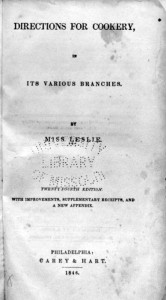 Don't miss the
Don't miss the 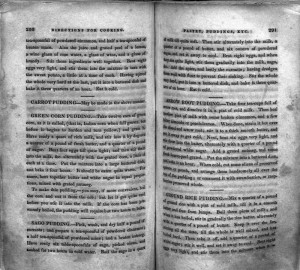
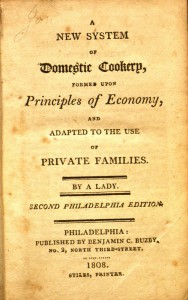 Maria Eliza Rundell (1745–1828) didn’t set out to be a domestic goddess. The widow of a surgeon, she collected recipes and household hints for her three married daughters. John Murray, a prominent publisher, happened to be a family friend, and Rundell gave him her recipe collection as a favor, expecting no financial reimbursement.
Maria Eliza Rundell (1745–1828) didn’t set out to be a domestic goddess. The widow of a surgeon, she collected recipes and household hints for her three married daughters. John Murray, a prominent publisher, happened to be a family friend, and Rundell gave him her recipe collection as a favor, expecting no financial reimbursement.

 Food Revolutions is now on view in the Ellis Library Colonnade. From the four humors to the discovery of vitamins, this exhibition examines our changing notions of healthy eating over two centuries. Food Revolutions brings together medical books, cookbooks, scientific publications, and dieting texts to illustrate our ongoing quest for health, and our changing relationships with food.
Food Revolutions is now on view in the Ellis Library Colonnade. From the four humors to the discovery of vitamins, this exhibition examines our changing notions of healthy eating over two centuries. Food Revolutions brings together medical books, cookbooks, scientific publications, and dieting texts to illustrate our ongoing quest for health, and our changing relationships with food.

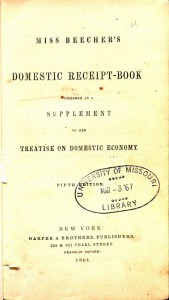 Catharine Beecher (1800-1878), the sister of the abolitionist Harriet Beecher Stowe, was an early feminist and advocate of women’s education. Beecher was at the forefront of the home economics movement in the nineteenth century. She sought to increase the status of traditional women’s work such as cooking and childcare, arguing for its value to society and the need for female education to inform this work.
Catharine Beecher (1800-1878), the sister of the abolitionist Harriet Beecher Stowe, was an early feminist and advocate of women’s education. Beecher was at the forefront of the home economics movement in the nineteenth century. She sought to increase the status of traditional women’s work such as cooking and childcare, arguing for its value to society and the need for female education to inform this work.
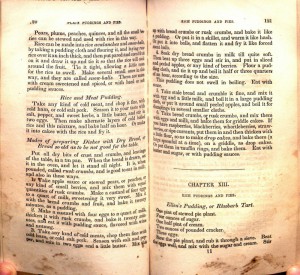
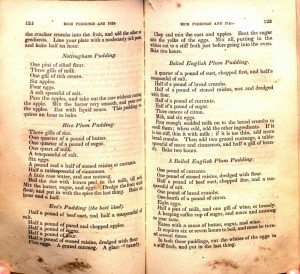
 As the oldest girl in a family of twenty-one children, Isabella Mayson (1836–1865) had ample practice in the domestic arts by the time she married Samuel Beeton at the age of 20. Samuel was an innovative editor and publisher, and Isabella participated fully in his publishing business, putting her domestic skills to work as editor of the English Woman's Domestic Magazine. The year after her marriage, Isabella also began work on the monumental compendium of domestic science that is The Book of Household Management. The book was first published it in 1861, when Isabella was only 25, and it was an immediate success due to her attention to accuracy, economy, and taste.
As the oldest girl in a family of twenty-one children, Isabella Mayson (1836–1865) had ample practice in the domestic arts by the time she married Samuel Beeton at the age of 20. Samuel was an innovative editor and publisher, and Isabella participated fully in his publishing business, putting her domestic skills to work as editor of the English Woman's Domestic Magazine. The year after her marriage, Isabella also began work on the monumental compendium of domestic science that is The Book of Household Management. The book was first published it in 1861, when Isabella was only 25, and it was an immediate success due to her attention to accuracy, economy, and taste.

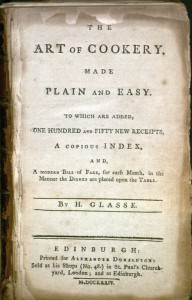 In March,Special Collections, Archives and Rare Books will be participating in
In March,Special Collections, Archives and Rare Books will be participating in 